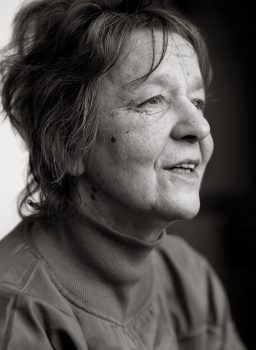On Sirkka Turkka
Issue 2/1982 | Archives online, Authors

Sirkka Turkka. Photo: Pertti Nisonen
1.
I met Sirkka Turkka towards the end of the sixties; she was a friend of a girl-friend of mine.
We called her Hemuli. Not that she bore any resemblance to the Hemulen of the Moomin books, but she did view the world with the same charitable curiosity as some of Tove Jansson’s immortal characters.
In the evenings Hemuli would speak with wit and wisdom, as the sky darkened, then paled towards dawn. Her words were spontaneous: she talked of nature, of the city, always with a gentle understanding, a compelling magic which dissolved ideas into music, full of a sad beauty, echoes of loneliness, painful and happy memories. She looked life straight in the eye, without illusions.
What I’m saying, Sirkka Turkka was a master of the spoken word. She was a story-teller, a ballad-singer, a reciter of epic tales, creating literature of a kind no longer recognized as literature.
2.
Hemuli was 34 in 1973 when her first book, Huone avaruudessa (‘A room in space’), was published; and she was hailed as a talented new poet, an astonishingly mature writer.
This first book was not, however, her first work. Hemuli’s early creations are lost, save in the memory of her friends – those long conversations. She began to turn to written literature in the early 1970s.
Finland is a country obsessed with age: middle age, for instance, is not what it is in Webster’s Second Edition: ‘the time of life between about 40 and about 60,’ but the period between the ages of 31 and 42, or 48.
The fact that Sirkka Turkka’s first book appeared when she was 34 should not be taken to imply that she was a late starter.
She doesn’t worry about age, status or any other labels; her reason for writing is not that she pretends to the way of life of a writer. It was through speaking that she found her authentic voice; only later did she learn to express herself in writing. And to love it.
3.
The spoken language is the natural way for people to communicate, the software of human intercourse.
The written language is the hardware. It is the instrument of power. Since the time of the earliest agrarian societies, and right down to our post-industrial era, writing has defined our laws, our edicts, our possessions: many of the earliest written texts were warehouse inventories, incised in clay.
This being the way it was and is, one of the functions of literature is to mediate between the spoken and written language: literature is seen to take on new life every time it succeeds in recapturing the gestures of the spoken language, the ease of natural communication.
Mediocre writers are apt to claim that they began to write because they had difficulty in expressing themselves in speech. Sirkka Turkka is not one of them. She is an innate master of language: her voice is, in her books as in her life, agile, perceptive, receptive, persuasive.
4.
Sirkka Turkka is a lyricist who writes dramatically moving epic. This is no mere flattery on my part. This is a statement of fact: it makes little sense to try to categorize her.
She is a north-east European nomad, a black sheep who is her own capable shepherd.
Her controlled unpredictability, the sombre stream of consciousness, recalls certain celebrated writers, emigrés from German-speaking Europe or from Ireland; or perhaps it is more relevant to compare her work to the music of Olivier Messiaen – her distinctly personal tonal language formed precisely by clear mystical feeling, infused with romantic and impressionistic elements.
Or again, the rhythmical vividness of her books brings to mind this century’s Latin-American writers; or perhaps more, the music of Heitor Villa-Lobos – with her cunning use of dissonance, with polyrhythmic structures of the greatest complexity, and unity.
No, neat definitions and learned comparisons do not capture Sirkka Turkka’s clear, direct voice: it is too elusive. It strikes too close to the heart.
Tags: poetry
No comments for this entry yet
Leave a comment
-
About the writer
Arto Kytöhonka (1944-1992) was a pioneer of Finnish computer literature and postal art. He was a prolific writer whose work included poetry, pamphlets, visual poems, computer poems, aphorisms, newspaper writing and prose fragments.
© Writers and translators. Anyone wishing to make use of material published on this website should apply to the Editors.
